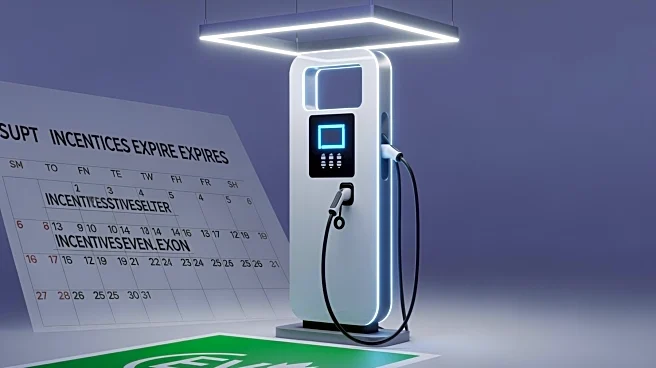What's Happening?
Rivian Automotive's stock has experienced a significant decline, dropping approximately 18% from its late-September highs. This downturn is attributed to growing investor concerns about the company's future prospects. Analysts, including Mizuho's Vijay
Rakesh, have downgraded Rivian's stock rating to 'Underperform,' citing slowing electric vehicle (EV) demand and the expiration of U.S. government incentives as potential challenges to Rivian's growth. Despite delivering 13,201 vehicles in Q3 2025, which marked a 32% year-over-year increase, Rivian has narrowed its full-year delivery guidance, indicating a potential decrease in production compared to 2024. The expiration of the $7,500 federal EV tax credit for leased vehicles on September 30 has further impacted demand, with analysts predicting a gap in Q4 sales.
Why It's Important?
The decline in Rivian's stock and the broader concerns about EV demand have significant implications for the U.S. automotive industry. The expiration of federal tax credits could lead to a reduction in EV market share, as noted by Ford's CEO, who warned of a potential drop from 10% to 5% without incentives. Additionally, new tariffs on imported EV components are increasing costs for manufacturers like Rivian, further challenging their financial outlook. The situation underscores the importance of government incentives in sustaining EV growth and highlights the potential for a slowdown in the sector, affecting both established companies and startups.
What's Next?
Rivian is focusing on its partnerships and growth plans to navigate these challenges. The company has formed a joint venture with Volkswagen to develop future EV platforms and has a substantial order from Amazon for delivery vans. Rivian is also investing in new models, such as the R2 crossover SUV, and expanding its production capabilities with a new factory in Georgia. Analysts will be closely monitoring Rivian's upcoming Q3 earnings call for updates on demand trends, tariff relief, and progress on new models. The company's ability to adapt to changing market conditions and secure additional capital will be crucial for its long-term success.
Beyond the Headlines
The broader EV market is facing headwinds, with companies like Tesla also warning of potential sales declines following the expiration of tax credits. The industry is grappling with high tariffs on batteries and parts, which are compressing margins. Rivian's ability to leverage its partnerships and brand appeal will be key to overcoming these challenges. The company's focus on cost reduction and production scaling is essential for achieving profitability and justifying its valuation. The outcome of Rivian's efforts could influence the trajectory of the EV market and the adoption of sustainable transportation solutions.

















